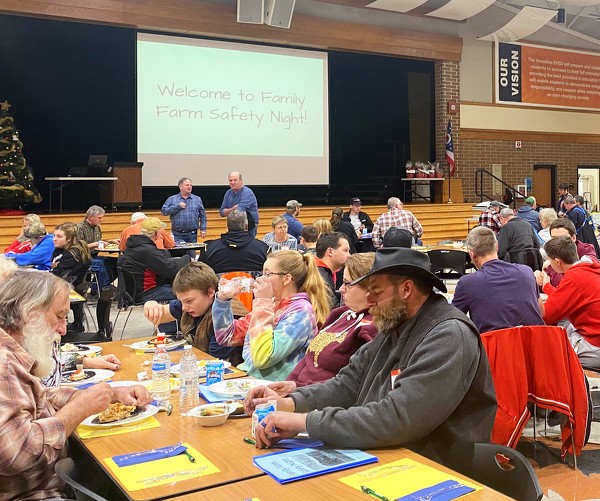Wednesday, December 15th, 2021
Farm safety event highlights many dangers
By Erin Gardner

Photo by Erin Gardner/The Daily Standard
Several farmers gathered Monday for an event on farm safety sponsored by the Versailles FFA.
VERSAILLES - A family farm safety seminar was held Monday in response to recent farm-related fatalities in the area.
About 100 people attended the free event sponsored by the Versailles FFA. Six speakers focused on grain bin and manure pit safety and the deadly gases produced in such confined spaces.
Dee Jepsen, state agricultural safety and health leader for Ohio State University Extension, said many times farmers working in confined spaces don't recognize the hazard until it's too late.
"We work around these areas all the time. We were not really told about confined spaces or gases," she said. "We know hazards exist on the farm. Farmers work in the most hazardous industry and yet, sometimes … accidents happen and things happen."
Failure to follow safe work procedures and emergency response procedures also are factors in fatal accidents in confined spaces, she said.
Jepsen said confined spaces have a limited opening for entry and exit, have poor ventilation and contain or produce dangerous air contaminants. On the farm, this can include sewers, underground pits, tanks, manure storage structures, grain bins and silos, she said.
"I think the most immediate and severe hazard that's associated with a confined space is the air quality," Jepsen said. "Most of the fatalities occur, about 60%, are either rescuers or would have been rescuers. It's not always our first responders. It's the farm families and I don't have to explain that. It's very tragic what your community is going through and I understand. It's hard on me too."
On Aug. 10, Gary Wuebker, 37, Brad Wuebker, 35, and Todd Wuebker, 31 died from the toxic fumes in a manure pit on their family's St. Henry farm. St. Henry Fire Chief Matt Lefeld had said the men were performing maintenance on a manure pump before the accident occurred. The eldest brother entered the underground tank first to fix a problem with the pump. When he was overcome by gases and passed out, another brother called for help and rushed in to try rescue his brother. Then a third brother went in to try to save the other two, according to information from The Ohio State University College of Food, Agricultural, and Environmental Sciences.
"I use the word incidents, not accidents because an accident is … an act of God and nothing could be done," Jepsen said. "An incident could be preventable, so I'm going to challenge everybody here … let's stop calling them accidents. Let's start thinking about them as preventable incidents."
Manure pit gases are the biggest concern for health and safety around manure handling and storage pits, according to Ohio State University Extension office.
Glen Arnold, field specialist and manure nutrient management, said there are four main gases in a manure pit that are a cause for concern.
Hydrogen sulfide is highly toxic, smells like rotten eggs and can lead to death. Carbon dioxide is non-toxic, colorless and odorless and is a normal product of decomposition. Ammonia is non-toxic and smells like urine. It can irritate the eyes and in high concentrations can cause shortness of breath. Methane is odorless and highly explosive, according to the presentation.
Frank Miller, Osgood Fire Chief, stressed the importance of ventilation when entering a manure pit or a silo.
"Get your ventilation going because we know what can happen when those gases are present," Miller said. "You guys know this better than I do. Get your ventilation going and keep it going when you're in there."
"Have a buddy out there with you," Miller continued. "You know, in the fire department, if we go inside a burning building, I can't do it by myself. I have to have a buddy with me. I have to have a buddy outside."
Miller also said when someone calls for help, they should be specific in what they need and where the emergency is located on the farm. Farmers should also be mindful of the fire department's response times.
He said the fire department has gotten four calls in the last week and a half and the average response time is 10-12 minutes. A fire doubles every three minutes, he said.
He said easy steps such as tying down a skid loader when bringing it from farm to farm, making sure cylinder locks are in place, using ventilation when entering a silo, making sure shut-offs for grain bins are in sight of an auger and using a harness when entering a grain bin can prevent many fatalities.
Reaction times differ depending on the scenario, said Lisa Pfeifer, educational program manager for OSU Extension.
"When you're completely focused, it's about two-tenths of a second before you react," she said.
The reaction time can increase to more than a second if the person is not paying attention or is distracted, she said.
Pfeifer said once someone is submerged in grain, they can't be pulled free without a risk of injury. It takes 625 pounds of force to pull out someone submerged to their shoulders in grain.
Famers, if they must enter the bin, should shut off and lock out all power, check the air quality inside the bin, use a safety harness and safety line, wear proper personal protective equipment, station another person outside the bin to monitor the entry and avoid the center of the bin, according to the presentation.
"The grain you have in your bin is worth a lot of money, but I hope that one day we'll be able to come to an understanding that it's not worth your life to enter a bin and take those risks," Pfeifer said.

